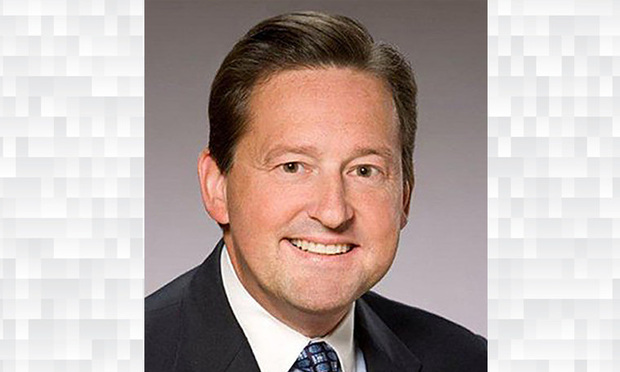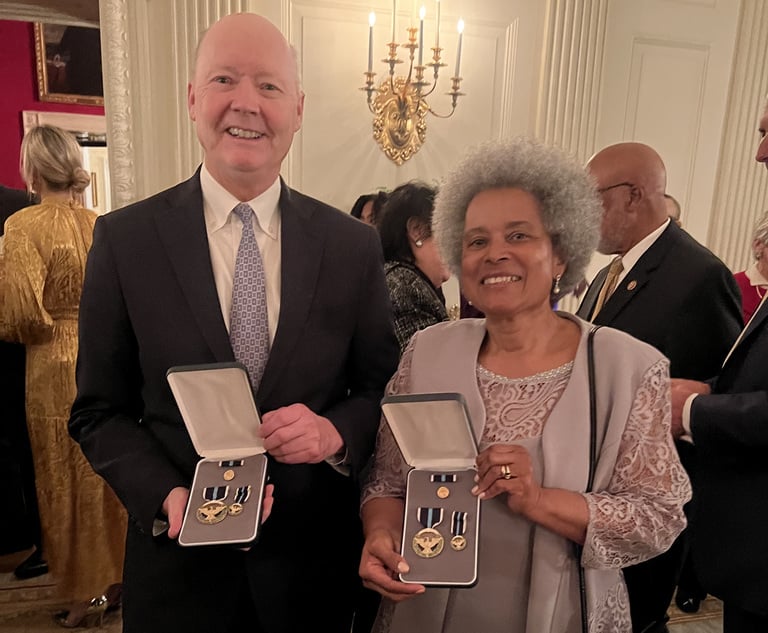Bouchard Tosses Derivative Suit Over CEO's Stock Repurchases
Chancellor Andre G. Bouchard said that while Richardson Electronics' board did mislead plaintiff Steven H. Busch in the run-up to the litigation, it was unclear whether Busch had actually relied on those representations in deciding whether to make a demand that the directors consider pursuing their own litigation.
November 15, 2018 at 03:20 PM
4 minute read
 Andre G. Bouchard.
Andre G. Bouchard.
The Delaware Court of Chancery has dismissed a derivative suit accusing the directors of technology company Richardson Electronics of hiding from investors the details of “flawed” stock buybacks by the firm's chief executive.
Chancellor Andre G. Bouchard on Wednesday said that while Richardson Electronics' board did mislead plaintiff Steven H. Busch in the run-up to the litigation, it was unclear whether Busch had actually relied on those representations in deciding whether to make a demand that the directors consider pursuing their own litigation.
Busch, who did make a pre-suit demand, argued that the decision should not qualify a concession that the directors were in a position to independently assess a potential suit. However, Bouchard found no evidence that the board was compromised and thus had secured the business judgment protections necessary for dismissal.
“Busch has failed to allege any particularized facts raising a reasonable doubt concerning the Special Committee's good faith and due care,” Bouchard said in a 41-page memorandum opinion.
The dispute stemmed from more than $3 million in stock repurchases that company chairman and CEO Edward J. Richardson and his charity, the Richardson Wildlife Foundation, made in 2013 and 2014. The buybacks, however, were not listed as related party transactions in the firm's public filings until August 2015.
After obtaining books and records from Richardson Electronics, Busch demanded that the company take action to unwind the deals or possibly file suit to rescind them. According to court documents, the board formed a special committee of outside directors, which retained the Delaware law firm Richards, Layton & Finger to aid in its investigation.
The special committee later complied a 30-page report, which expressed concerns about the accuracy of some of the company's disclosures but ultimately found no basis for litigation.
In his lawsuit, Busch said that the company's counsel had told him in letters that the transactions were done pursuant to a repurchase plan and administered by a third-party broker—statements that both turned out to be false, according to the report. Busch said in his complaint that had he known about those misrepresentations, he never would have made the demand, given the board's alleged potential for liability.
Busch argued that the case should be reviewed under the Chancery Court's Zapata standard for rejecting a motion to dismiss when the demand is excusable, challenging the committee's independence based on affirmative representations.
But Bouchard said the heart of Busch's complaint challenged the board's failure to disclose the transactions to stockholders, as opposed to actions that the directors declined to take.
“Although the complaint is not a model of clarity, the conduct it challenges appears to focus on the board's conduct when it rejected Busch's demand, shortly after the special committee completed its investigation,” Bouchard wrote.
“This is because the complaint asserts a single claim for breach of fiduciary duty against the five directors who were on the board when the demand was rejected for failing 'to properly disclose [the transactions] to stockholders or take action to recover damages as a result of Richardson's breaches of fiduciary duty.'”
Attorneys for both Busch and the board declined to comment Thursday on the ruling.
Busch was represented by Peter Safirstein and Elizabeth S. Metcalf of Safirstein Metcalf in New York and Peter B. Andrews, Craig J. Springer and David M. Sborz of Andrews & Springer in Wilmington.
Richards Layton attorneys Blake Rohrbacher, Kevin M. Gallagher and John M. O'Toole represented directors Paul Plante, James Benham and Kenneth Halverson. Richardson was represented by P. Clarkson Collins Jr. of Morris James in Wilmington.
The company was represented by Garrett B. Moritz and Roger S. Stronach of Wilmington's Ross Aronstam & Moritz.
The case was captioned Busch v. Richardson.
This content has been archived. It is available through our partners, LexisNexis® and Bloomberg Law.
To view this content, please continue to their sites.
Not a Lexis Subscriber?
Subscribe Now
Not a Bloomberg Law Subscriber?
Subscribe Now
NOT FOR REPRINT
© 2025 ALM Global, LLC, All Rights Reserved. Request academic re-use from www.copyright.com. All other uses, submit a request to [email protected]. For more information visit Asset & Logo Licensing.
You Might Like
View All
Here's What Corporate Litigators Expect Delaware Courts to Address in 2025
6 minute read
Tesla, Musk Appeal Chancery Compensation Case to Delaware Supreme Court
2 minute read
Fed Judiciary Panel Mulls Authority to Ban In-State Bar Admission Requirements

Delaware Legal Figures Who Played Key Roles in Ending School Segregation Honored With Presidential Citizens Medal
3 minute readTrending Stories
- 1People in the News—Jan. 10, 2025—Lamb McErlane, Saxton & Stump
- 2How I Made Partner: 'Be Open With Partners About Your Strengths,' Says Ha Jin Lee of Sullivan & Cromwell
- 3Essential Labor Shifts: Navigating Noncompetes, Workplace Politics and the AI Revolution
- 4The Coordinate Jurisdiction Rule on Insurance Bad Faith Litigation
- 5South Carolina Physicians Challenge Abortion Ban Under Religious Freedom Claims
Who Got The Work
Michael G. Bongiorno, Andrew Scott Dulberg and Elizabeth E. Driscoll from Wilmer Cutler Pickering Hale and Dorr have stepped in to represent Symbotic Inc., an A.I.-enabled technology platform that focuses on increasing supply chain efficiency, and other defendants in a pending shareholder derivative lawsuit. The case, filed Oct. 2 in Massachusetts District Court by the Brown Law Firm on behalf of Stephen Austen, accuses certain officers and directors of misleading investors in regard to Symbotic's potential for margin growth by failing to disclose that the company was not equipped to timely deploy its systems or manage expenses through project delays. The case, assigned to U.S. District Judge Nathaniel M. Gorton, is 1:24-cv-12522, Austen v. Cohen et al.
Who Got The Work
Edmund Polubinski and Marie Killmond of Davis Polk & Wardwell have entered appearances for data platform software development company MongoDB and other defendants in a pending shareholder derivative lawsuit. The action, filed Oct. 7 in New York Southern District Court by the Brown Law Firm, accuses the company's directors and/or officers of falsely expressing confidence in the company’s restructuring of its sales incentive plan and downplaying the severity of decreases in its upfront commitments. The case is 1:24-cv-07594, Roy v. Ittycheria et al.
Who Got The Work
Amy O. Bruchs and Kurt F. Ellison of Michael Best & Friedrich have entered appearances for Epic Systems Corp. in a pending employment discrimination lawsuit. The suit was filed Sept. 7 in Wisconsin Western District Court by Levine Eisberner LLC and Siri & Glimstad on behalf of a project manager who claims that he was wrongfully terminated after applying for a religious exemption to the defendant's COVID-19 vaccine mandate. The case, assigned to U.S. Magistrate Judge Anita Marie Boor, is 3:24-cv-00630, Secker, Nathan v. Epic Systems Corporation.
Who Got The Work
David X. Sullivan, Thomas J. Finn and Gregory A. Hall from McCarter & English have entered appearances for Sunrun Installation Services in a pending civil rights lawsuit. The complaint was filed Sept. 4 in Connecticut District Court by attorney Robert M. Berke on behalf of former employee George Edward Steins, who was arrested and charged with employing an unregistered home improvement salesperson. The complaint alleges that had Sunrun informed the Connecticut Department of Consumer Protection that the plaintiff's employment had ended in 2017 and that he no longer held Sunrun's home improvement contractor license, he would not have been hit with charges, which were dismissed in May 2024. The case, assigned to U.S. District Judge Jeffrey A. Meyer, is 3:24-cv-01423, Steins v. Sunrun, Inc. et al.
Who Got The Work
Greenberg Traurig shareholder Joshua L. Raskin has entered an appearance for boohoo.com UK Ltd. in a pending patent infringement lawsuit. The suit, filed Sept. 3 in Texas Eastern District Court by Rozier Hardt McDonough on behalf of Alto Dynamics, asserts five patents related to an online shopping platform. The case, assigned to U.S. District Judge Rodney Gilstrap, is 2:24-cv-00719, Alto Dynamics, LLC v. boohoo.com UK Limited.
Featured Firms
Law Offices of Gary Martin Hays & Associates, P.C.
(470) 294-1674
Law Offices of Mark E. Salomone
(857) 444-6468
Smith & Hassler
(713) 739-1250






